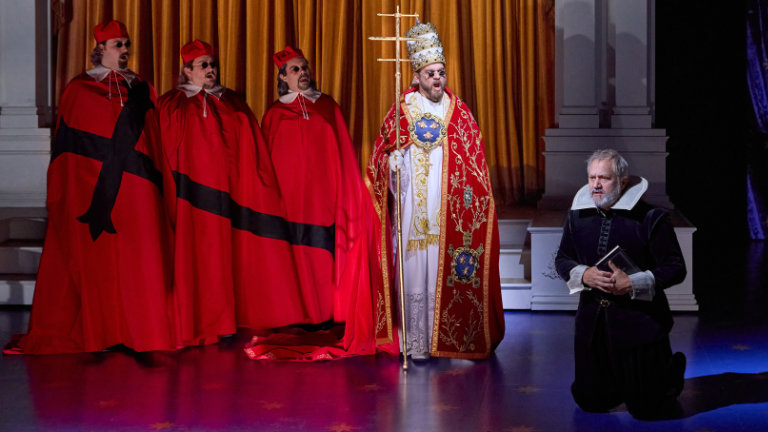Live Theater Reviews
Review: Opera Theatre of Saint Louis Closes The Season with the Heavenly Galileo Galilei

Audiences are being blinded with science by Opera Theatre of Saint Louis’ stunning Galileo Galilei. Closing its 49th season, this company debut explores the dichotomy between science and theology through the life of Galileo, a visionary who challenged the churchy science of the 17th century and paved the way for modern astronomy.
Originally, Phillip Glass’s 2002 opera (with a libretto by playwright Mary Zimmerman) was not planned for this year’s season. However, scheduling mischief allowed for its inclusion, much to the benefit of the audience who are treated to a tour de force of sight and sound.
Told in nonlinear time, the opera incorporates Galileo’s memories and reflections from the 17th century (near his death) to the 16th, when he was a boy. Using flashbacks as a template, the audience shares key moments in the astronomer’s life from various perspectives.
The son of composer Vincenzo Galilei, Galileo emerged from his father’s shadow to make remarkable astronomical discoveries. Unfortunately, the idea of the Earth moving around the Sun put him in direct conflict with the Catholic Church.
The opera begins with a blind and elderly Galileo reflecting on his life and how his ideological notion of a heliocentric model of the solar system doesn’t jive with church elders, including Pope Urban VIII, who was his former friend and sponsor. This revolutionary idea, now an established scientific fact, is the crux of his inner turmoil, professional reputation, and standing with the Vatican.
Accused of heresy, the scientist is mocked and scolded by several cardinals who place him on trial. Despite recanting his findings, Galileo is sentenced to home confinement for the remainder of his life.
From here the opera moves into more emotional terrain as Galileo’s relationship with his daughter, Maria Celeste, is explored. Sequestered in a convent, she sends her father treats and a rose from her garden.
Spiraling further backward, the production delves into Galileo’s relationship with the future pope. As younger men, they shared intellectual discourse and enjoyed each other’s company.
The tension is loosened by “Six Minutes of Science,” a dynamic mini-course in which many of the famed astronomer’s ideas are explained (think of it as a fusion of Bill Nye the Science Guy and comedic opera). Here, singers in lab coats delightfully unpeel Galileo’s teaching with props and models.
Having lived a rich life of discovery, including developing a refracting telescope in 1610, the final scene finds Galileo looking back at his youth as he watches one of his father’s operas. This vibrant scene uses music and science to provide closure for a man whose genius was unrecognized in his lifetime.
While Galileo Galilei focuses on the scholar’s scientific achievements, it also delves into core themes found in many of Glass’ works: the role of the individual versus society; the roles of memory and time, spirituality; and the pursuit of knowledge.
Captivating and visually stunning, Galileo Galilei is a triumphant work of art brought to life by stage director James Robinson. Under his care, the opera delicately balances science and faith with perfect pacing and an incredible array of performances from the ensemble.
To heighten the drama, set designer Allen Moyer relies on a minimalist stage. Strategically placed at its center is an Italian Renaissance-era portico that pivots and turns as needed to change the setting. Its placement is enhanced by visual backdrops from projection designer Greg Emetaz.
Emetaz’s creations are a character in their own right. Opening the heavens to audiences, they are jaw-dropping and bold. These visualizations allow the drama to extend beyond the confines of a traditional stage set in the same way Galileo’s discoveries expanded the worldview in his time.
The sky and stars in the heavens are contrasted by brightly colored vestments and other outfits from costumer Marco Piemontese, whose color palette matches the atmosphere of various scenes. His creations for Galileo Galilei are the best costumes of the season.
Framing the opera’s ideological skirmishes musically was the excellent Kwamé Ryan, who conducted members of the Saint Louis Symphony Orchestra. Moving from brash to serene and back again, his soundtrack was powerful.
On stage, the opening scenes are highlighted by Paul Groves. This gifted tenor gives a performance bristling with inner conflict. His Galileo is tinged with regret and defiance. Giving an emotionally intense performance, you can hear the frustration in his voice.
Groves’ work alongside Hunter Enoch is incomparable. Playing both the Pope and the pontiff’s younger self, his wonderful work encapsulates the sternness and propriety required in the role. His voice is majestic.
Soprano Vanessa Becerra’s aria as Maria Celeste in the first half of the opera is a highlight. It is an astounding performance. Last seen onstage at OTSL in 2023’s Cosi Fan Tutte, she is a remarkable talent whose gifted voice will hopefully return to the company again soon.
Clocking in at just over ninety minutes, Galileo Galilei packs a lot of science and religious falderol in a compact amount of time. Heliocentrism versus geocentric doctrine aside, this is a powerful presentation that speaks to defiance and intellectualism through art.
Opera Theatre’s brilliant Galileo Galilei is an emotionally charged must-see production. It arrives at a time when art and science are both under scrutiny, making the themes of this glorious production more prescient than ever. As a result, this vibrant season finale is bold and thought-provoking.
Galileo Galilei runs through June 29 at the Loretto-Hilton Center on the campus of Webster University. Productions at Opera Theatre St. Louis are in English with musical accompaniment from the St. Louis Symphony Orchestra. For more information on programming or the 2024 season, visit opera-stl.org

Photos: Eric Woolsey


